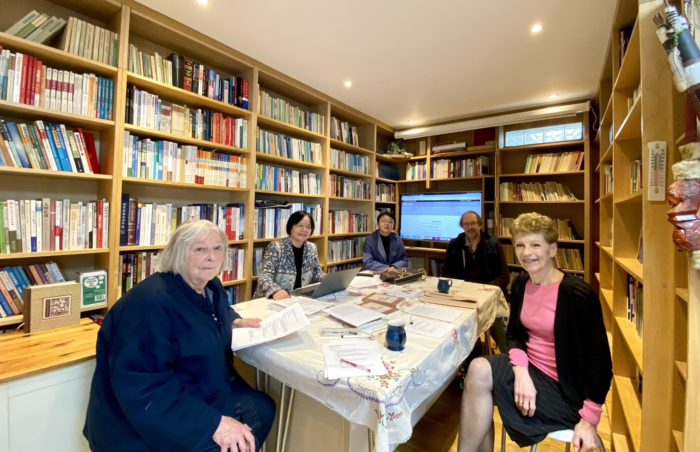
Global China Academy and Global Century Press’s Activities in May 2023
During a series of events in May, supported by the GCA Board of Trustees, the Global China Academy and Global Century Press actively promoted international academic cooperation and China related studies worldwide. These activities demonstrated the academy’s emphasis on knowledge sharing, as well as the importance of understanding China’s role in the contemporary world.

On May 5, during Dr Grace Yuan Cheng’s visit to the UK, the GCA Board of Trustees held a hybrid meeting, chaired by Ingrid Cranfield. Charles Grant participated online. The second photo from the left above shows, from left to right, Dr Thomas Clarke, Dr Frances Wood, Ingrid Cranfield, Dr Yuan Cheng and Professor Xiangqun Chang.
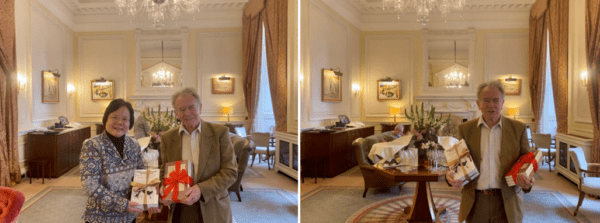
On May 11, Professor Xiangqun Chang presented four copies of the mainland Chinese edition of China and the Shared Human Future: Exploring Common Values and Goals to the author, Professor Martin Albow, on behalf of the China National Publications Import & Export (Group) Co. Ltd., which co-developed this publication project with GCP. She also presented four copies of the English edition of the book published by Global Century Press (shown in the photos above).
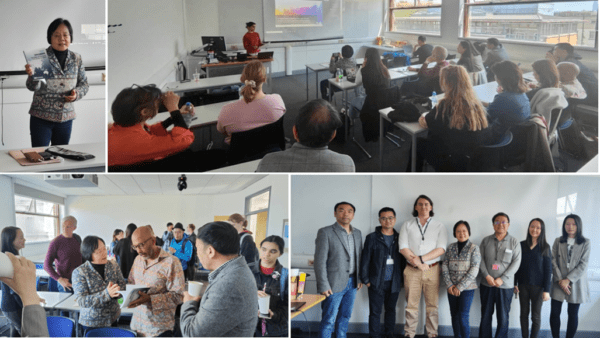
On May 23, Professor Xiangqun Chang was invited to give a presentation at the inaugural China-Focused Research Forum hosted by SOAS, University of London. This event was organised by the student societies of SOAS, LSE and King’s College London. Dr Lianyi Song, Principal Teaching Fellow in the Department of East Asian Languages and Cultures at SOAS (third from the right in the third photo above), oversaw the proceedings. Dr Song is one of the founding editors of the Journal of Chinese for Social Science (JCSS), which GCP publishes. This forum represented a good opportunity to foster engagement among students dedicated to China studies and the learning of the Chinese language. Sam Hardy (third from the left in the thrid photo above), chaired the forum. The attendees included two Chinese sociologists among the four Chinese Visiting Fellows. They are notable for being the first Visiting Fellows from China after the COVID pandemic.
The activities in May demonstrate a commitment to deepening the understanding of China’s contributions to the world. Through efforts such as publishing important works and participating in events, GCA plays an important role in promoting social scientific work with a global perspective and efforts of cross-discipline engagement in social linguistics.
Click here to visit the GCA news & blog section.
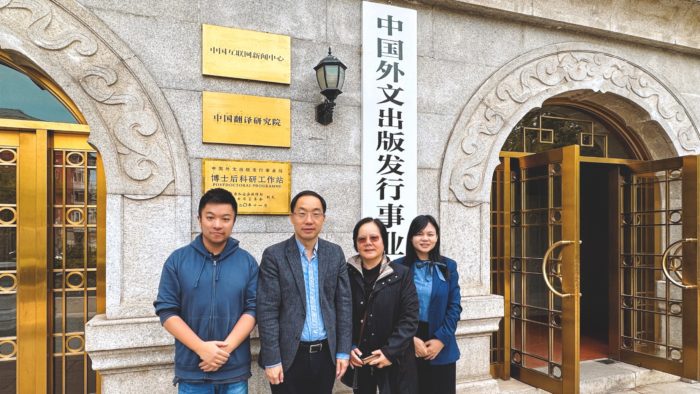
Social Mission Activities and Reflection of GCA President Xiangqun Chang in China, April 2023
During her visit to China in April 2023, Professor Xiangqun Chang, President of the Global China Academy (GCA), participated in various social mission activities, encompassing a range of meetings, visits to sponsors, and personal explorations. These activities reflect the organization’s and her own commitment and efforts to promote global understanding and cooperation.
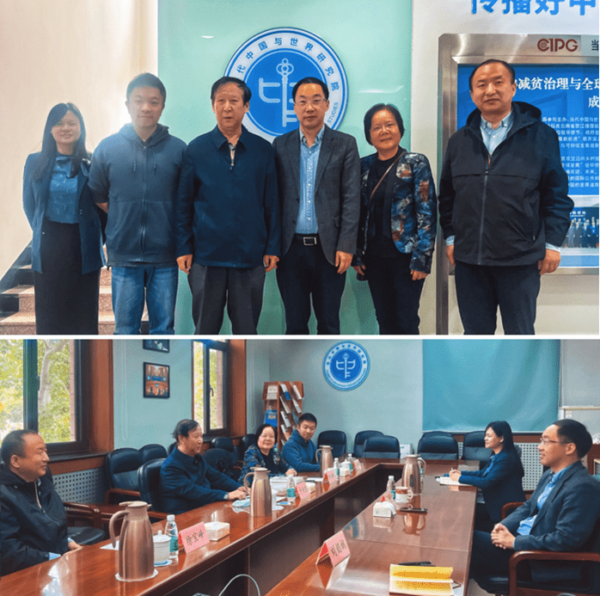
On the morning of April 21st, a meeting took place at the Academy of Contemporary China and World Studies (ACCWS) within the China International Publishing Group (CIPG). Dr YU Yunquan (3rd from the right in the top photo), Director of ACCWS, chaired the session. Dr YU Hongjun (3rd from the left in the top photo), former Vice Minister of the International Department of the Central Committee of the Communist Party of China (IDCPC) and Director of the Centre for Contemporary World Studies, was present as well. He had previously delivered a greeting message at the 6th Global China Dialogue on Governance for World Peace. Professor XU Baofeng from BLCU (1st from the right in the top photo), Director of the Belt and Road Research Institute, Director of the World Sinology Centre, and DU Yichao, Director of Wuxi Institute of New Culture, PhD student at UCL, and GCA Associate (2nd from the right in the top photo), also participated in the meeting. The purpose of this gathering was to advance the GCA’s social mission, specifically in preparation for the 8th Global China Dialogue on Governance for Global Health (GCD III).
During the meeting, Dr YU Hongjun highlighted the shared challenges faced by China and the rest of the world, including climate change, energy security, global health governance, and global economic stability, emphasizing the need for dialogue and collaborative efforts to address these issues. Dr YU Yunquan underscored ACCWS’s objective of fostering understanding and research on China’s global role, committing to the development of a multidisciplinary research platform aimed at expanding global knowledge of China through publishing, seminars, and international collaborations. Professor Xu Baofeng discussed the establishment of the World Sinology Centre and the organization of international conferences in China. Professor Chang Xiangqun shared insights from her observations and experiences in China, focusing on China’s engagement in global governance, its proactive involvement in the United Nations, and other multilateral institutions. She discussed the importance of dialogue in enhancing China’s comprehension of its global responsibilities. The meeting concluded with the decision that the Journal of Contemporary China and World Studies would sponsor GCD III, contingent upon receiving a report on Governance for Global Health, and the Deputy Director of ACCWS would deliver the closing remarks at the final session.
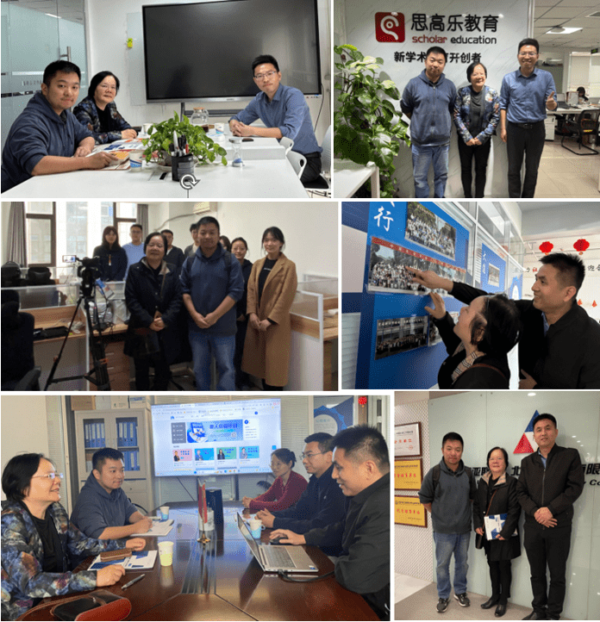
On the afternoon of April 21st, accompanied by DU Yichao, visits were made to two sponsors of the Global China Dialogues series. The first visit was to Xueshuzhi (学术志 Academic Unwavering), a brand under Scholar Education Ltd., an academic dissemination and education platform established by doctoral graduates from prestigious universities. Gathering over 2 million highly educated individuals, primarily university faculty, doctors, and masters, Xueshuzhi has been dedicated to supporting the research community’s growth. It aims to promote the dissemination and development of academic knowledge, enhance domestic researchers’ levels, and advance social sciences in China. During this visit, Dr SONG Yiping (right in the top photos), a founder of the company, recalled his initial encounter with Professor Chang approximately ten years ago, at which time he was employed as an editor at Renmin University Press. He conveyed his continued support for the Global China Dialogues.
Following this, a visit was made to Xueshuwan (学术湾 Academic Harbour), a brand of M.Y.Union, a high-tech enterprise established in 2012 specializing in software development that integrates teaching, practice, and research. Focused on developing new technologies for the social service sector, Xueshuwan offers comprehensive IT solutions to educational, government, and social service organizations. With a commitment to rigorous and practical approaches, the company has achieved rapid and sustainable growth, supported by a team of skilled developers and expert advisors in sociology and social work. Its products, tailored for the modern technological landscape, are applied across various sectors, including universities and government agencies. The General Manager, Mr JIANG Biao (right in the bottom photos), who first met Professor Chang during her lecture at Changchun University of Science and Technology in 2019, provided a tour of the company and showcased projects developed during the COVID years.
Xueshuwan, Xueshuzhi, and the Wuxi Institute of New Culture, sponsors of the 6th, 7th, and forthcoming 8th Global China Dialogues, offer free services for live streaming or recorded broadcasting of the dialogues through their platforms in China. They also provide audio and video recordings for archives, transcriptions, translations, and dual-language subtitles for videos shown during the dialogues. Their willingness to sponsor the GCD series with their resources and expertise was expressed at the GCA’s founding ceremony. Click their names to watch the greeting videos by JIANG Biao, SONG Yiping and DU Yichao.
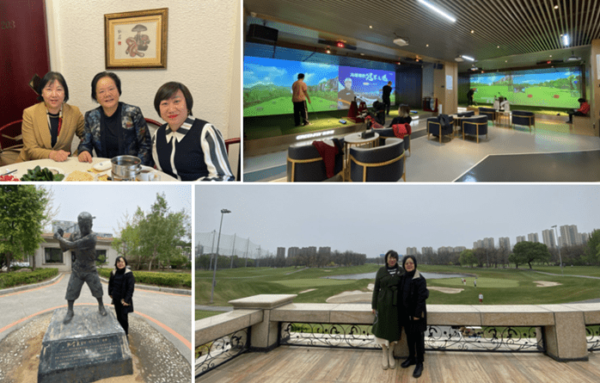
During the trip to Shenyang, where her mother resides, Professor Chang also visited places of interest, a consistent component of her fieldwork in China. Through a golf acquaintance, she was introduced to DAI Yanyan (to her left in the top left photo), Deputy Director of the Student Innovation and Entrepreneurship Development Centre at Shenyang Jianzhu University, and ZHANG Changyan (to her right in the top left photo), a chief lawyer. With their assistance, on the morning of April 27th, Yanyan and Professor Chang visited Shenyang Century Golf Club. This club features an 18-hole, 72-par course that spans 700,000 square meters and was inaugurated in 2006. Its design incorporates both Western and Asian elements, emphasizing environmental conservation with its abundant tree coverage and high-quality grass landscapes. The clubhouse is equipped with luxurious amenities and panoramic views, providing a diverse array of leisure and business facilities, such as restaurants, bars, a fitness centre, among others. Situated in the development zone of Tiexi District, close to the airport and highways, the club offers convenient access. It integrates sports, leisure, and business, delivering a premium experience for its members. The club’s viability is attributed to the Tiexi District hosting over 1,300 enterprises from 40 countries and regions, including 83 multinational corporations and 21 Fortune Global 500 companies.
Moreover, Shenyang is recognized as the cradle of golf in China. The statue shown in the bottom left photo is of Chang Hsueh-liang or Zhang Xueliang (张学良, 1901-2001), a warlord who ruled Manchuria from 1928 to 1936. Zhang, who was introduced to golf in Shenyang in 1917 after joining the Fengtian Christian Youth Association, founded China’s first golf team in 1920 with officials from China, Britain, France, America, and other countries. Initially planning to construct the first 18+1 hole golf course in Beidaihe in 1927, he instead established a nine-hole ‘mini-golf’ course, which was launched at the Shenyang Tongze Club in 1930.
On the afternoon of April 27th, Yanyan escorted Professor Chang to the Shenyang Aoyuehui City Golf Club, an indoor golf multifunctional centre. The owner, Mr. ZHAO Haixin, revealed that the facility occupies 1,200 square meters and features 6 public hitting bays, 3 VIP rooms, each equipped with a Greenjoy Hengtaixin golf simulator. Beyond these, the club boasts a water bar, rest area, and additional public entertainment facilities. It serves freshly ground imported coffee, fashionable beverages, imported red wine and beer, teas from various regions, and premium Chinese and Western snacks. According to Mr Zhao, these offerings have ensured him a stable income even through the COVID years, affording him a lifestyle comparable to the upper-middle class in Western nations.
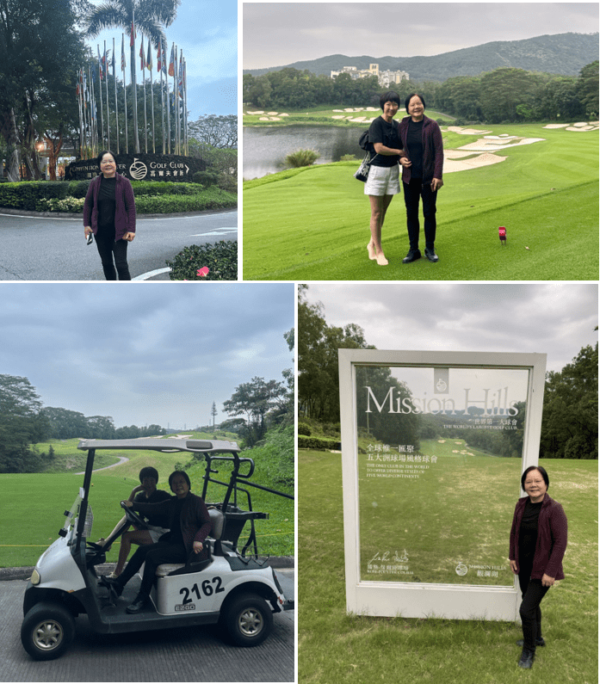
On the afternoon of April 30th, Professor Chang visited the Mission Hills Golf Club (观澜湖高尔夫球会), which is affectionately deemed the ‘home golf club’ of her friend Wang Jie due to its closeness to Wang’s residence. The disparity in the club’s Chinese and English names stems from ‘Guanlan’ (观澜), denoting a town surrounded by hills but without a lake (湖). Established in 1992 and inspired by its mission (使命) amid the hills (群山), the club has constructed numerous artificial lakes over an expansive area of 20 square kilometres across Shenzhen and Dongguan. Designed by twelve globally renowned golf figures, it comprises 12 courses, each with 18 holes (a total of 216 holes), distinctively integrating golf course styles from all five continents. This characteristic granted it the Guinness World Record for the ‘World’s Largest Golf Club’ in 2004. However, during the COVID years, the club experienced a downturn in business relative to the indoor golf multifunction centre in Shenyang, leading to job losses for numerous caddies.

Back in the UK, the ‘home golf club’ for Professor Chang is the Mill Hill Golf Club, situated just a two-minute walk from her residence. Construction began in 1924, and the club opened in 1927. Occupying less than one square kilometre of woodland within Moat Mount Open Space and Scratchwood, it is part of section 16 of the London LOOP (The London Outer Orbital Path). This path nearly encircles Greater London, covering almost 150 miles (approximately 388.5 square kilometres) and divided into 24 sections. Moat Mount Open Space is home to the man-made Leg of Mutton Pond, and near Scratchwood within the golf course is Stoney Wood Lake, fed by Deans Brook, which flows through the northern edges of Edgware, merges with the Silk Stream, continues into the Brent River, and finally joins the Thames River in West London.
The Global China Academy pursues dual missions. Its academic mission focuses on deepening the global understanding of China and Chinese people through global and comparative perspectives, worldwide fellowships, and rigorous research. Supported by its subsidiary, Global Century Press, which publishes esteemed scholarly works, the academy aims to enhance global cooperation and understanding, preparing young leaders for societal contributions. The Global China Dialogues platform facilitates significant exchanges to cultivate a more inclusive global community, transforming research into tangible societal benefits. Nestled at the foot of Mill Hill, amid woodlands and a nearby lake, the Global China Academy is likened to a quaint ‘academic temple’, endearingly referred to as ‘Mission Hill Temple’.
During her visit to China in April 2023, Professor Xiangqun Chang’s interactions with key institutions and individuals highlighted the Global China Academy’s commitment to fostering global understanding and cooperation. Her fruitful meeting with the Academy of Contemporary China and World Studies (ACCWS) and her engagements with two key sponsors of the Global China Dialogues series—Xueshuzhi and Xueshuwan—underscored the collaboration with organizations dedicated to academic knowledge dissemination and providing technological solutions for social services, laying the groundwork for the 8th Global China Dialogue. Moreover, Professor Chang’s comparative perspective on golf clubs in China and the UK emphasized the sport’s global nature, transcending geographical and cultural boundaries. By aligning the cooperative spirit of golf with her academic and social missions, she showcased the potential convergence of personal interests and professional goals, promoting a more inclusive and interconnected world.
- Click here to view Global China Academy’s President Professor Xiangqun Chang’s Academic Activities in Beijing, 18-20 April 2023
- Click here to view Global China Academy’s President Professor Xiangqun Chang’s Academic Activities in Xiamen, Wuhan and Tianjin, 4-11 April 2023
- Click here to see the GCA Centre’s facilities: Driveway, Garden, Function Rooms, Libraries, Dining Area, Bedrooms, and more.
- Click here to explore the 5 ‘walk and talk’ routes, including tea and lunch. The PDF file can be downloaded.
- Click here to reach us including details on how to visit us.
- Click here to visit the GCA news section.
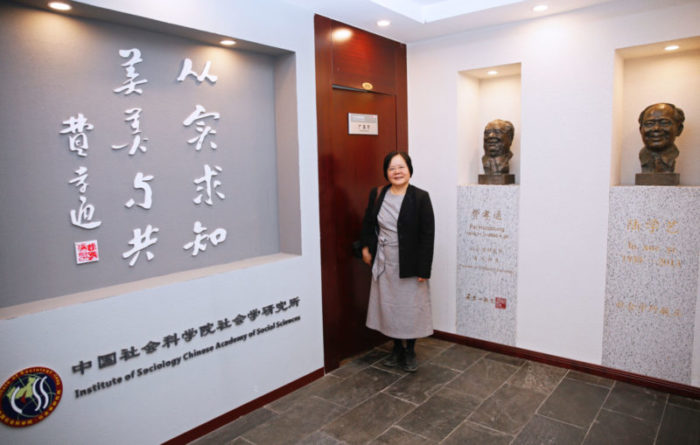
Global China Academy’s President Professor Xiangqun Chang’s Academic Activities in Beijing,18-20 April 2023
Introduction
On the occasion of being an invited speaker at the ‘International Conference: The Chinese Path to Modernization and the Pursuit of Humanity’s Common Values’ at Xiamen University from April 4-6, 2023, I visited China and conducted a series of lectures, seminars, and academic exchanges at various universities in Xiamen, Wuhan, Tianjin, and Beijing. In addition to fulfilling my academic responsibilities, I also participated in events and activities aligned with the social mission of the Global China Academy. This part includes only academic activities in Beijing from 18-20th April.
Timeline
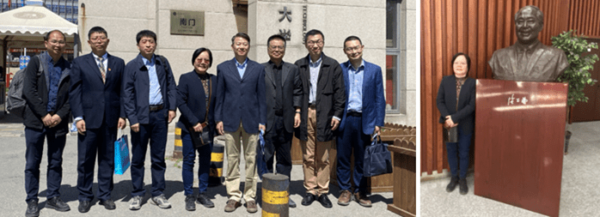
On the afternoon of April 18th, I visited the School of Humanities and Social Sciences at Beijing University of Technology (BUT). It was established by Professor LU Xueyi (1933-2013), the former Director of the Institute of Sociology at the Chinese Academy of Social Sciences (CASS) and former President of the Chinese Sociological Association. I paid tribute to Professor LU Xueyi’s statue (right photo), a reason that will be explained in the section on the CASS seminar. I also met Professor TANG Jun (one my left in the left photo), Dean of the School of Humanities and Social Sciences, and his colleagues. We knew each other since Professor Tang worked at CASS. Coincidentally, I also met Professor LI Xiaozhuang (on my right in the left photo), from the Institute of Sociology at the Beijing Academy of Social Sciences (BASS). He was Professor Lu’s PhD student. I met him in 2014 when he was working on sorting through Lu’s more than 1,000 diaries.
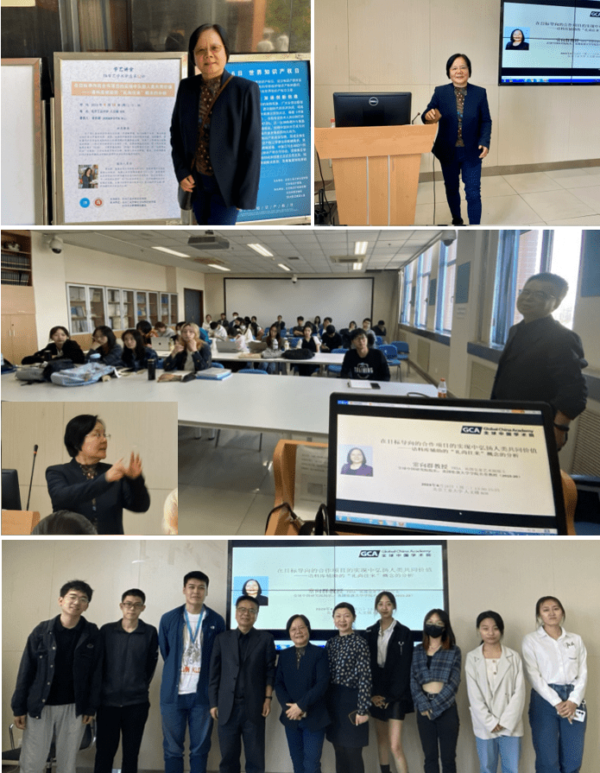
Professor LI Junfu (on my right in the bottom photo) chaired the lecture I delivered. He was a Visiting Fellow at the University of Oxford in 2019. He presented a paper titled ‘Society Building: Peacemaking with Chinese Characteristics’ at the 6th Global China Dialogue: Governance for World Peace, which I organized. The title of my lecture was ‘Realization of Goal-Oriented Cooperative Projects, Promoting the Common Value of Mankind: A Corpus-Assisted Analysis of ‘recipropriety’ (lishang-wanglai 互适). Dr CAO Feilian (on my left in the bottom photo), Associate Professor, joined the lecture. She acted as the interpreter for Professor LU Xueyi when he gave a seminar on society building at LSE in 2011, which I arranged when I worked there.
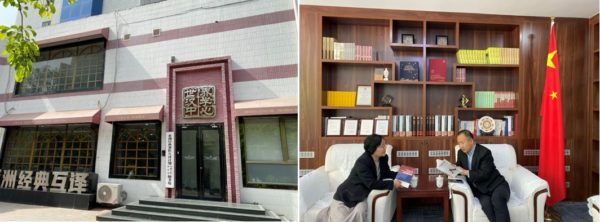
On the morning of Aprol 19th, I was invited by Professor XU Baofeng (right in left photo) for a meeting in his office at Beijing Language and Culture University (BLCU). He is Director of the Belt and Road Research Institute, Director of the World Sinology Center, Head of the Secretariat for the Asian Classics Inter-Translation Project, Leader of the National Project for the Chinese and Foreign Sinologists and Translators Talent Database and Chinese Culture Translation and Research Network. He was an invited speaker at the 6th Global China Dialogue: Governance for World Peace, where he delivered the paper ‘Can Confucian Ethics Help in the Elimination of Global Unilateralism, Extremism and Terrorism Based on a Comparison Between Countries and Regions with and without Influence from Confucius Ethics?’ in 2019. Professor Xu collaborated with the GCA in several ways. For instance, he published a paper titled ‘China’s Contribution to the Future of Governance’ by Professor Martin Albrow in the inaugural issue of the journal he founded, World Sinology Information (01), on April 28, 2020. He facilitated Professor Albrow’s participation and publication of the paper ‘The Prospects of the Belt and Road Initiative in the Post-pandemic Era: A Dialogue’ in the Guangming International Forum, which was published in the Guangming Daily on May 27, 2020. With his assistance, the Global Century Press published a book titled Witnessing China Combating COVID-19: My Story in China in both English and Chinese. Both Professor Albrow and I were invited speakers at the UN Chinese Language Day, discussing sinology and the Chinese language during the epidemic, and the Ceremony to Launch the International Cangjie Plan on April 19, 2020. In this meeting, we explored different possibilities of collaboration.
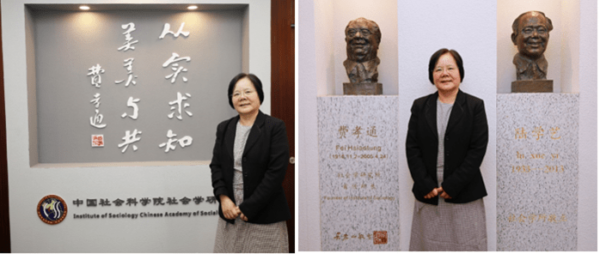
On the afternoon of April 19th, I was invited to give a lecture at the Institute of Sociology (CASS). I always feel at home there because my academic achievements are closely related to two great figures there: LU Xueyi (statue to my left in the right photo) and Fei Xiaotong (statue to my right in the right photo). I was introduced to LU Xueyi in 1987 by the successor of Fei Xiaotong, the then Director of the Institute of Sociology, Professor HE Jianzhang (1926-2004), when LU was serving as the Deputy Director there. It came at a time when the institute had just been granted the first major project on Marxist Sociology Theoretical Studies in China, funded by the National Social Science Foundation (NSSF) (1987-1991). Professor He offered me a position there before I graduated with my Master’s degree in 1987, as the application for the major project was likely to be successful. I was the only person in China who had received three years of training in Marxist sociology under Professor Ding Kequan at Northeast Normal University and was willing to work on this project. Professor Lu became the Director in 1988 and led the major project until 1991. As a team member, my book, On Marxist Sociology (1992) was a significant outcome of the project. I worked closely with Professor Lu and maintained a good relationship with him. After his passing, I wrote his obituary and published it in Network, the Magazine of the British Sociological Association, Winter 2013, p44.
Although my primary research focus was on Marxist sociology with CASS, I was a lecturer in Sociology at the People’s Public Security University of China (PPSUC). This role was a direct result of Fei Xiaotong’s efforts to promote sociology in public security universities in Nanjing and Beijing, starting in 1984. PPSUC recruited me right after I graduated in 1987, recognizing the unique position I held as a postgraduate from the only normal university in China offering an MA degree in sociology at the time. Coincidentally, shortly after becoming a Visiting Fellow at City University in 1991, I joined an ESRC-funded research project co-developed by Professor Stephan Feuchtwang and Professor SHEN Guanbao (1949-2016) when he was as a Visiting Fellow at LSE. Given that Shen was the only PhD student Fei Xiaotong supervised at CASS, Kaixiangong Village, Fei’s fieldwork site, naturally became a focal point in our project. My subsequent book, Guanxi or Li Shang Wanglai?: Reciprocity, Social Support Networks, Social Creativity in a Chinese Village (2010/2011 in both English and Chinese), was the result of extensive fieldwork in that village. Additionally, I served as a co-editor of FeiXiaotong Studies (3 volumes in both English and Chinese).
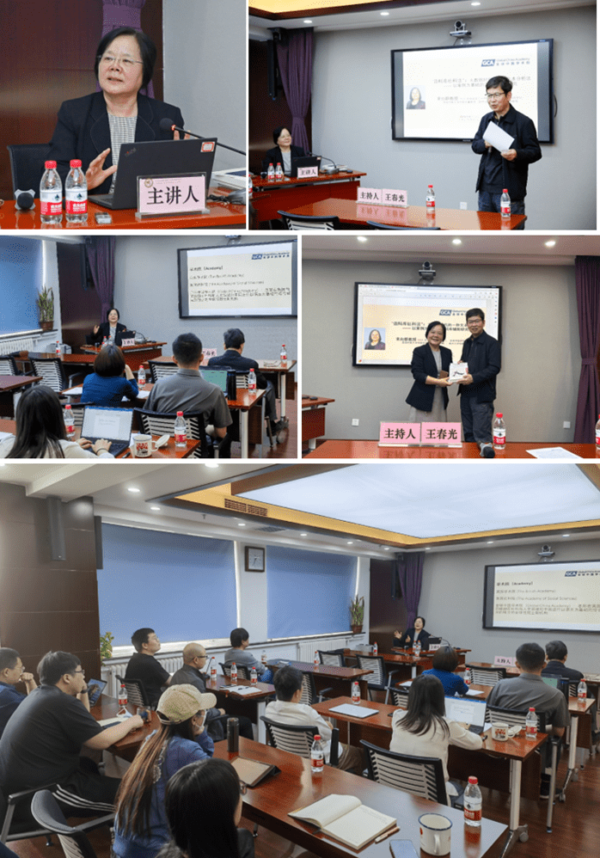
The title of my talk was ‘A Text Analysis Method in the Era of Big Data: Corpus-Assisted Research Based on Case Studies’. It was chaired by WANG Chunguang (pictured top right), Deputy Director of the Institute of Sociology at CASS and Deputy Secretary-General of the Chinese Sociological Association. The arrangement was facilitated by FU Xuejun, Director of the Research Office of the Institute of Sociology. Afterwards, we discussed the changes that have occurred over the past three decades at the Institute, as he is the only remaining individual from the time I worked there on the NSSF-funded major project who has yet to retire.
During my talk, I shared related corpora such as the collected works of Ding Kequan, a pioneer of Marxist sociology, Fei Xiaotong’s complete works, and Marx and Engels’ Complete Works. I learned that LU Xueyi’s complete works (10 volumes) have just been published to commemorate the 10th anniversary of Lu’s death. They would be a great addition to my collection of corpora. Dr YU Qin, an Assistant Research Fellow at the Anti-Corruption Research Office, informed me that she completed her PhD under the supervision of Professor SU Jinzhi at the Institute of Linguistics, CASS. Professor Su is the former President of the Chinese Social Linguistics Association. Dr Yu would like to collaborate with me to apply corpus approaches to her work. She also sent me some of her related published papers later.
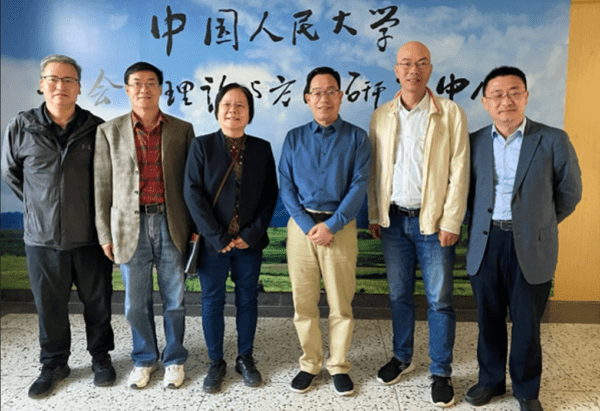
On the late afternoon and evening of April 19th, after I finished my talk at CASS, I attended a short meeting at the Ministry of Education’s Research base — Centre for Sociology Theory and Methodology at Renmin University of China. It was founded by Professor ZHENG Huangsheng (1936-2014), former Vice-President of Renmin University and former President of the Chinese Sociological Association. My first meeting with Professor Zheng was at a sociology conference in Shenyang in 1985. He had been my mentor for about three decades because we shared common interests. In 2014 he chaired a lecture for me and signed a certificate of Professional Research Fellow with no time limit at the Centre, a few months before his passing. Afterwards, I wrote ‘Zheng Huangsheng: Life and Work’ and published it in Network, the Magazine of the British Sociological Association, in Spring 2015.
The meeting was chaired by Professor FENG Shizheng (to my left in the top photo), Dean of the School of Sociology and Demography (and was promoted to Vice-President of Renmin University in October 2023), Professor LU Yilong, Deputy Director of the Centre (to my right in the top photo), Associate Professor HUAN Pingqing (second from the right in the top photo), Associate Professor HUANG Jialiang (first on the right in the top photo), Deputy Dean of the School of Sociology and Demography, and LI Suocheng (first on the left in the top photo), Manager of the Centre Office.
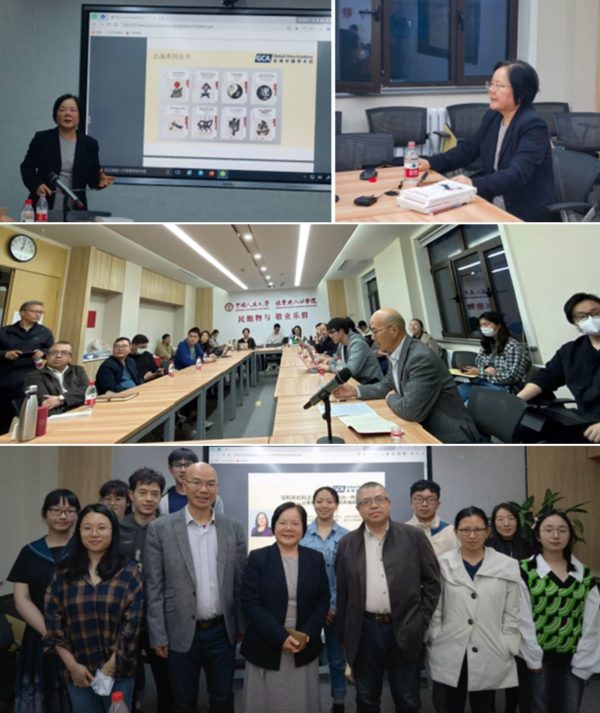
The seminar was held in the evening, titled ‘A Text Analysis Method in the Era of Big Data: Corpus-Assisted Research Based on Case Studies.’ It was chaired by Dr Huan Pingqing (first right in the middle photo), who has conducted many studies on Fei Xiaotong. He was an invited speaker at the 6th Global China Dialogue: Governance for World Peace, where he delivered the paper ‘Confucius’ Thoughts on Ethnic Relations and Its Significance to World Peace’ in 2019. He then became a Visiting Fellow at the University of Oxford in 2020, a tenure that was interrupted by COVID-19.
Professor ZHAO Xudong (to my left in the bottom photo) attended the seminar. He is the Director of the Institute of Anthropology at Renmin University and was the last PhD student under Fei Xiaotong’s supervision at Peking University. During the Q&A session, we discussed how ChatGPT could influence corpus approaches to social scientific studies. This question emerged from all my lectures and seminars conducted in China. My explanation highlighted that ChatGPT is an excellent tool for generalizing answers to general questions, providing outlines for study topics, summarizing existing work of interest, drafting letters, copy editing, and performing bidirectional translations between English and Chinese, among other tasks. It poses a challenge to all electronic data-based analysis. While it complements the corpus-assisted method, it cannot replace it. This limitation stems from ChatGPT’s inability to provide specific words in related references and their contexts. Also without reading and reserach, one cannot formulate a scientific question to effectively engage ChatGPT in conversation and further studies.
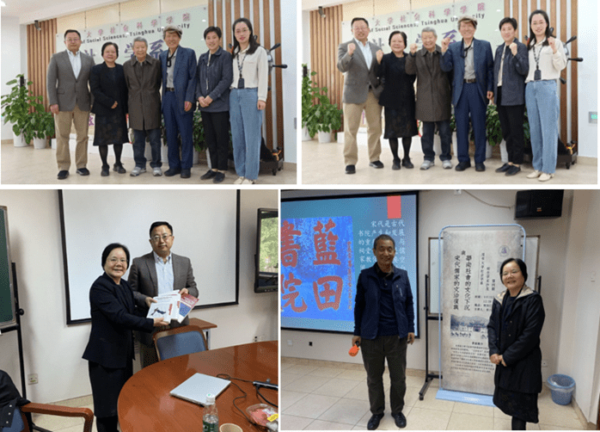
On the morning of April 20th, I, along with GCA Life Fellow HAN Sang-jin (3rd from the right in the top photos), Professor Emeritus at the Department of Sociology, Seoul National University, Korea, had a meeting at the Department of Sociology, Tsinghua University. Professor LI Qiang (3rd from the left in the top photos) joined us. He is the former Dean of the School of Social Sciences at Tsinghua University and former President of the Chinese Sociological Association. He also serves as the Chinese President of the GCA Council and is a Founding Fellow of GCA. The top two photos showcase different styles of group photos: Chinese style and Korean style, provided by Professor Han afterwards along with a note expressing a determination to collaborate among the three parties. This sentiment was echoed in his video greetings at the GCA’s founding ceremony, as presented by Professor LI Qiang (click here to watch). Dr. ZHENG Lu (1st from the left in the top photos) chaired the meeting. He is Deputy Head and Associate Professor of Department of Sociology and the ‘RONG’ Professor of Data Sciences at Tsinghua University. I presented him with some publications published by Global Century Press (left photo in the bottom row), and he expressed a willingness to collaborate with GCA. He delivered a speech entitled ‘Good Finance and Good Society: Financial Institutional Reform’ at the 7th Global China Dialogue: Reforming Global Governance in 2021. Dr. ZHAO Yizhang (1st from the right in the photos) from the Department of Sociology and Dr. CHEN Yulin (2nd from the right in the photos) also attended the meeting. The right photo in the bottom row features Professor ZHANG Xiaojun and me beside a poster of his lecture. He is the former Director of the Institute of Anthropology at Tsinghua University. We met at a national sociological conference in Guangzhou 38 years ago and have maintained a good relationship since then.
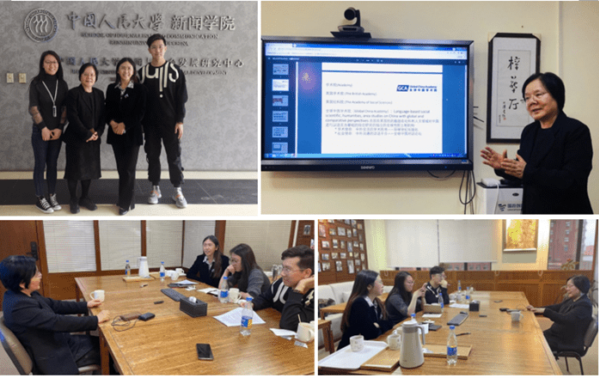
On the afternoon of April 20th, I was invited by Professor ZHONG Xin (2nd from the left in the top photo), Deputy Director of the Institute of Public Communication at the School of Journalism, Renmin University of China. As mentioned in the above section at Wuhan University, media studies in Remin Uinversity is another major discipline among the top four universities in China. After she and her PhD students gave me a guided tour of the institution, centers, and school, she held a meeting for academic exchanges. She shared with me her involvement in a national social science project, one of whose sub-projects focuses on researching the persuasive power of China’s discourse on universal human values. I presented materials related to my talks and used the books published by GCP as examples.

On the evening of April 20th, I had a dinner meeting with Professor GU Yueguo (middle in the right photo) and his wife, Professor LAN Chun. Professor Gu is a Research Professor of Linguistics and the Head of the Contemporary Linguistics Department at the Chinese Academy of Social Sciences (CASS) and former Pro-Vice-Chancellor of Beijing Foreign Studies University (BFSU), China. He is also Life Fellow of the Global China Academy (click here to watch the greeting video at the GCA’s founding ceremony) and an Executive Editors of the Journal of Corpus Approaches to Chinese Social Science (JCACSS) in both English and Chinese Editions.I met Professor Gu at an International Colloquium on New Discourses in Contemporary China at Lancaster University in September 2007. He expressed interest in my talk on ‘Lishang-wanglai: a Chinese model of social relations and relatedness’. It was my attempt to cross into the discipline of social linguistics and learn about his related work. Professor LAN Chun (left in right photo) is the former Director of the Linguistics Center at the School of English, Beijing Foreign Studies University (BFSU). She also serves as the Executive Editor of the Journal of Chinese for Social Sciences (Chinese Edition), published by Global Century Press. She arranged a hybrid GCA meeting in Beijing in November 2022.
While I was in Beijing from April 18th to 20th, I participated in a series of meaningful academic activities involving some renowned institutions in the capital of China. Firstly, I delivered a speech at the School of Humanities and Social Sciences at Beijing University of Technology, founded by Professor LU Xueyi. Following that, during my visit to the Chinese Academy of Social Sciences, I revisited the foundations of Chinese sociology and reflected on the influences of Fei Xiaotong and LU Xueyi on my work. These visits underscored the advancements in social science research methods in the digital age. My experience at Renmin University of China emphasized the importance of interdisciplinary approaches in social sciences, collaborating with the Center for Sociological Theory and Methodology to explore complex social issues. Engaging with scholars from Tsinghua University, Renmin University’s School of Journalism, Beijing Language and Culture University, and Beijing Foreign Studies University was also fruitful. In conclusion, this academic journey in Beijing highlighted the vibrancy of intellectual exchange and the deep connections between Chinese social science and the global academic community, emphasizing the evolving nature of research fields and the collaborative spirit driving our understanding of social dynamics.
By Xiangqun Chang
- Click here to view Global China Academy’s President Professor Xiangqun Chang’s Academic Activities in Xiamen, Wuhan and Tianjin, 4th-11th April 2023
- Click here to view Social Mission Activities and Reflection of GCA President Xiangqun Chang in China, April 2023
- Click here to see the GCA Centre’s facilities: Driveway, Garden, Function Rooms, Libraries, Dining Area, Bedrooms, and more.
- Click here to explore the 5 ‘walk and talk’ routes, including tea and lunch. The PDF file can be downloaded.
- Click here to reach us including details on how to visit us.
- Click here to visit the GCA news section.
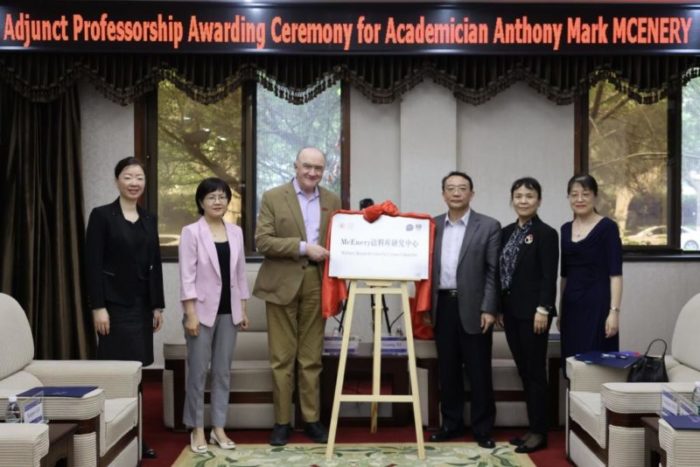
Global China Academy Council Chair Professor Tony McEnery’s Academic Activities in China, April-May 2023
Introduction
In 2023, the Global China Academy Council Chair, Professor Tony McEnery FAcSS, distinguished Professor of Lancaster University, had been appointed as a distinguished Chair Professor at Xi’an Jiaotong University (XJTU). As a renowned expert in corpus linguistics, he engaged in various academic activities in China. His contributions included inaugurating the ‘McEnery Corpus Research Center’ at XJTU and delivering insightful lectures at several universities. These lectures, covering topics such as ‘Language Matters,’ ‘Corpus Linguistics, Learner Corpora, and Second Language Acquisition,’ and the application of corpus linguistics in the era of big data, showcased his commitment to linguistic research and interdisciplinary study. His activities in China highlighted the dynamic and evolving nature of corpus linguistics and its potential to address complex social issues, emphasizing the importance of continuous innovation and critical evaluation in research methods.
Timeline
On the afternoon of April 17, 2023, Professor Tony McEnery was appointed as a Chair Professor at Xi’an Jiaotong University (XJTU). The Vice President of Xi’an Jiaotong University, XI Guang, met with Professor McEnery and presented him with a certificate, and adorned him with the XJTU badge. During the meeting, XI Guang and McEnery jointly unveiled the ‘McEnery Corpus Research Center’ at the School of Foreign Languages of XJTU.
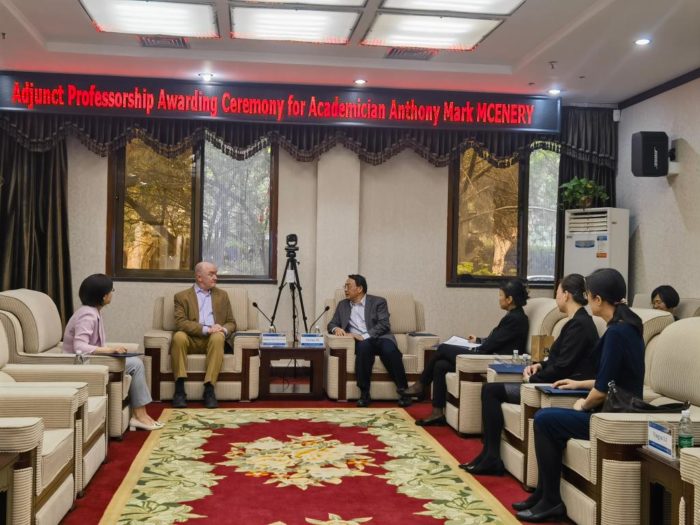
XI Guang expressed his hope that this appointment would serve as a starting point to build a cooperative bridge and further promote new achievements in inter-university collaboration. Professor McEnery stated his intention to fully leverage his personal capabilities to continue actively promoting cooperation between both parties and to embark on more substantive joint work.
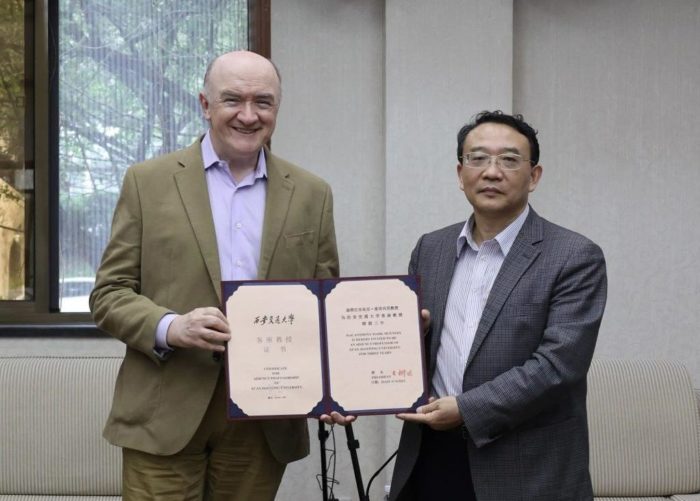
After the meeting, Professor McEnery presented a lecture entitled ‘Language Matters’ to the faculty and students of Xi’an Jiaotong University (XJTU).
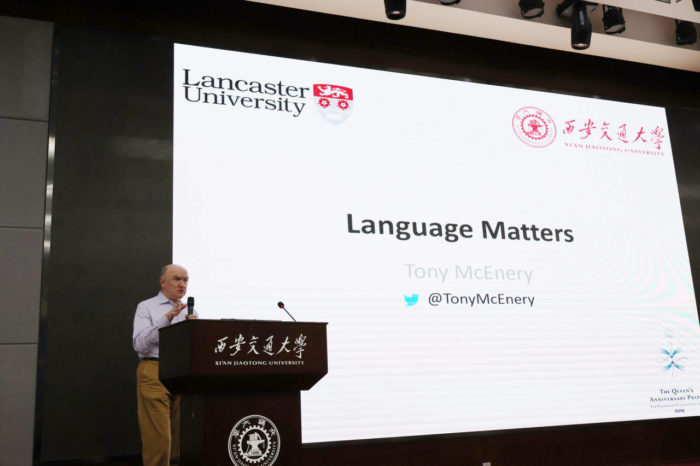
The lecture was divided into three parts: exploration, critical evaluation, and technological innovation. Professor McEnery used three classic studies from the ESRC-CASS Centre at Lancaster University, UK, as cases to illustrate the innovation in linguistic research methods to the audience, and sparked their thinking about interdisciplinary and cross-disciplinary research and technology in the era of big data. Professor McEnery emphasized that language itself and its role in different areas of social life are of undeniable importance. The use of large-scale text corpora is significant in linguistic research, and employing interdisciplinary research methods to analyze the relationship between language and society is of great importance. It enables researchers to analyze real language more deeply and in detail, providing new perspectives and methods for understanding social phenomena. During the question-and-answer session, the attending faculty and students engaged in discussions with Professor McEnery about parts of the lecture that interested them.
On the afternoon of April 19, Professor Tony McEnery gave a lecture at the School of Foreign Studies of Xi’an Jiaotong University titled ‘Corpus Linguistics, Learner Corpora, and Second Language Acquisition.’ Starting from perspectives such as research origins, corpus size, interdisciplinary interaction, and research objectives, he analyzed the relationship between learner corpora and second language acquisition research and offered research suggestions. The faculty and students present actively asked questions, engaging in more in-depth discussions and exchanges with Professor McEnery on topics such as language theory, foreign language learning, and the relationship with corpora.
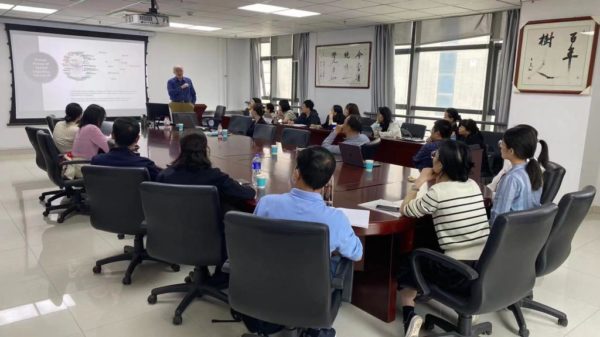
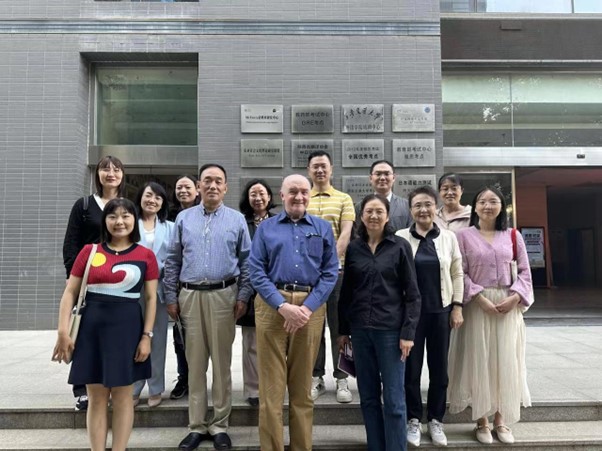
On the afternoon of April 20th, Professor Tony McEnery engaged in academic exchange at the Institute of Foreign Languages and Literatures of Xi’an International Studies University. He delivered an academic speech titled ‘Corpus Linguistics: Past, Present, and Future,’ in which he detailed the three important stages that corpus linguistics has undergone from its origins to its rapid rise, and discussed the future trends in the discipline in the context of the big data era.
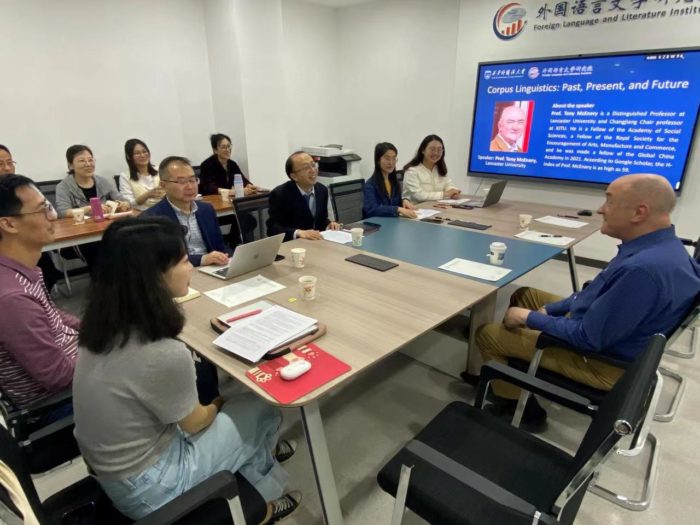
On the morning of April 23, Professor Tony McEnery gave an academic report titled ‘Language Matters’ at the School of Foreign Languages of Zhejiang Gongshang University, with the session chaired by Professor Qian Yufang.
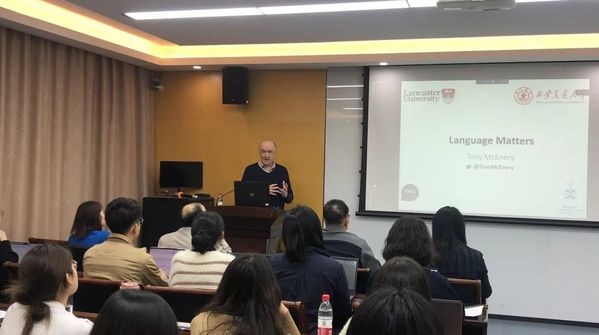
Professor McEnery discussed the role of language in different contexts and how linguists collaborate with other fields to explore issues related to their core subjects. Through ongoing cases at the ESRC Centre for Corpus Approaches to Social Science (CASS) at Lancaster University, he demonstrated how language research can innovate methodologies, thus fostering a critical evaluation of ‘big data’ technologies.
He emphasized that the methods used should be grounded in our identity as linguists and also evaluated by linguists. By analyzing cases such as 17th-century English, patient feedback in the UK National Health Service, and Islamophobia in British news media, he showed how to combine advanced corpus methods with linguists’ insights into language, thereby revealing the value of the research.
The significance of this lecture lies in demonstrating the potential for linguists to conduct interdisciplinary research in different social contexts and historical periods. By collaborating with other fields, linguists can uncover new insights into language and its impact on society. This interaction is not one-way, as linguists can also reflect on their own practices and find various explanatory frameworks through language analysis.
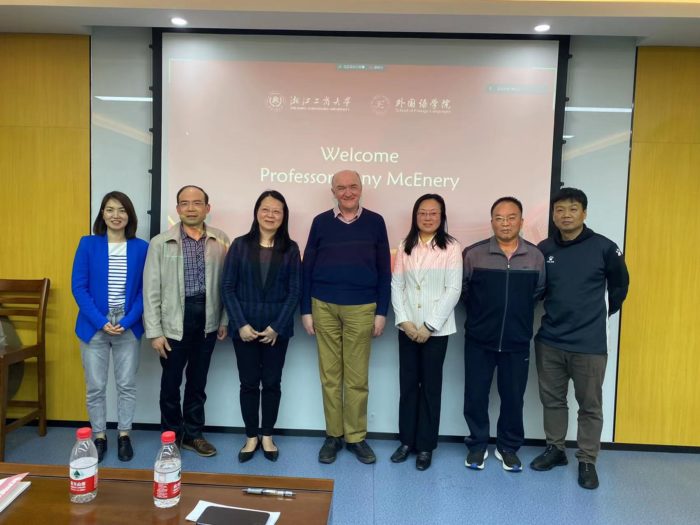
On April 24, Professor Tony McEnery delivered a lecture titled ‘Language Matters’ at Shanghai International Studies University, hosted by Professor HU Kaibao. This lecture had the same title as the one he delivered at XJTU on April 17.
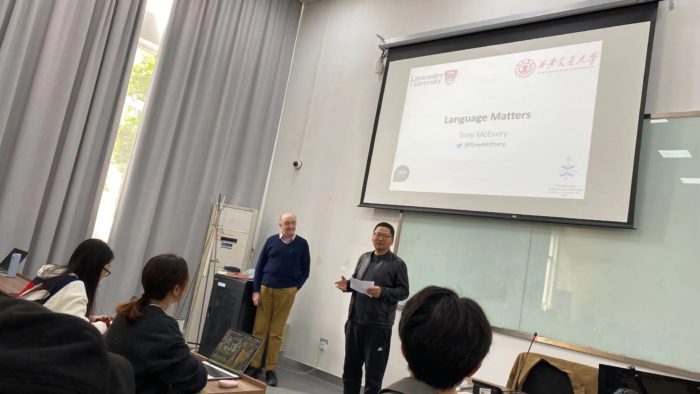
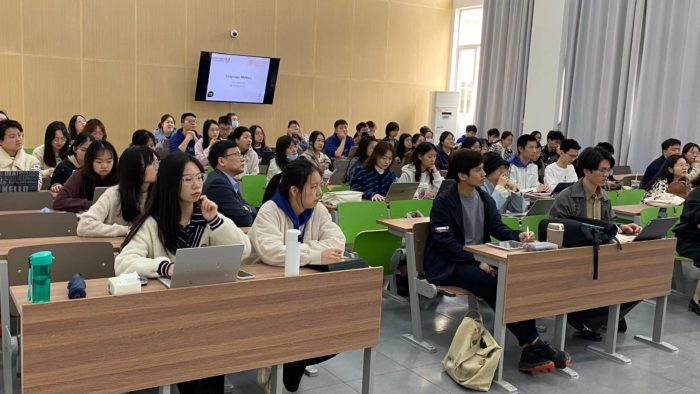
On the afternoon of April 26th, Professor Tony McEnery gave an academic lecture titled ‘Discourse, Language Learning, and Learner Corpora’ at the School of Foreign Studies, Xi’an Jiaotong University, as part of the ‘High-End International Expert Masterclass Series’. Professor McEnery discussed the relationship between discourse, language learning, and learner corpora, and raised many thought-provoking questions and suggestions related to language acquisition research, using specific case studies. After the lecture, there was an in-depth exchange and discussion with the students and faculty on topics such as discourse structure annotation, the construction of new types of corpora, corpus-based pragmatics research, and the limitations of learner corpora.
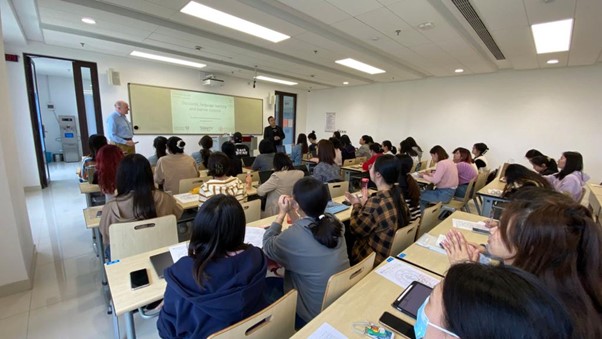
Professor Tony McEnery said that he had a highly enjoyable visit to China in April and May. His base was at Xi’an Jiaotong University, where he holds a prestigious Chair Professorship. During his stay, he engaged in providing valuable advice to staff, PhD candidates, and undergraduate students. Additionally, he delivered a series of lectures, highlighting the significant impact that studying large collections of language data, known as corpora, can have on the social sciences. Professor McEnery also had the opportunity to speak on the same topic at Xi’an International Studies University, Zhejiang Gongshang University, and Shanghai International Studies University. His interactions with numerous colleagues in China were not only enjoyable but also insightful, particularly in observing the keen interest in the study of language as a component of the social sciences in China. In October, Professor McEnery attended a conference at Xi’an Jiaotong University. This conference brought together scholars from around the world to discuss the intersection of language, data, and society. Before and after the October conference, Professor McEnery also participated in online forums.
Professor Tony McEnery’s academic activities in China, highlighted his prominent role in the field of corpus linguistics. His series of lectures, including ‘Language Matters’ and discussions on topics like discourse analysis, language learning, and learner corpora, showcased his commitment to advancing linguistic research, particularly in the context of big data. His interactions, spanning various universities and covering a range of linguistic topics, not only fostered academic exchange but also reflected the dynamic and evolving nature of corpus linguistics. McEnery’s visit was instrumental in demonstrating the potential of linguistics to address complex social issues and the importance of continuous innovation and critique in linguistic research methods.
Note: Photos and texts have been provided by the organizers of events.
- Click here to view Global China Academy Council Chair Professor Tony McEnery’s Academic Activities in Hong Kong and China, 2024.
- Click here to view Global China Academy Council Chair Professor Tony McEnery’s Academic Activities in China, September-November 2023.
- Click here to visit Professor Tony McEnery FGCA page.
- Click here to visit News and blog section.

